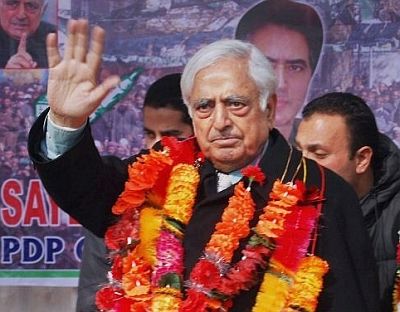 'What made him so adored even among those who didn't agree with him?
'What made him so adored even among those who didn't agree with him?
'It was his sincerity and a clear heart that throbbed for Indian unity which won him admiration across the faults of the political divide,' says Tarun Vijay, MP.
Just last week I was at the All Indian Institute of Medical Sciences, enquiring about his health and speaking to the doctors attending to him.
Inside the ICU, he was unable to respond, but I knew he loved me and would have been happy to see me. It was impossible for me to go to Kashmir and return without having breakfast or lunch with him in his room with a fabulous view of the garden he and Mehbooba had nurtured for years.
Often we would hand pick cherries from his home. Once Mehbooba insisted, "I can't let you go without these fresh ones, Mufti Sahab would be annoyed otherwise."
Such was his affection and love for a man who differed with many of his political beliefs.
Kashmiriyat, the core of Indian values if I saw living in someone, it was in the heart of Mufti Mohammad Sayeed.
I met him immediately after the formation of the new coalition government in J&K. He was not in his usual form, but his eyes showed warmth and his hug made me emotional.
I presented him a portrait of the great Tamil saint poet Thiruvalluvar. I requested him to propagate Thiruvalluvar's message in J&K, especially in Kashmir universities where Thirukural would merge effortlessly with the great messages of Sufi saints.
Without a minute of hesitation, he put that portrait in his sitting room, himself finding a most prominent place and said, "Yes, we shall do it. Send me a formal proposal with his writings."
What made him so adored even among those who didn't agree with him on many issues?
It was his sincerity and a clear heart that throbbed for Indian unity which won him admiration across the faults of the political divide.
We had been publishing scathingly critical reports about him in Panchjanya -- issues like Rubaiyya Sayeed were raked up every now and then, but I remember Atalji telling me once after seeing one such issue, 'Don't push people to take extreme postures with your extreme criticism. Ultimately, everyone has to be in India and work for Indians, shades may differ, that should not mean they are unpatriotic.'
I took that lesson and refrained from using that kind of language again. I think it is the same Atal doctrine that made a BJP-PDP alliance possible this time, a historic one.
In June when I had a long chat in his Srinagar home, which ended with a sumptuous Kashmiri dinner with Mehbooba, the Muftis were sure the alliance with the BJP was historic and making it succeed would mean defeating fissiparous and divisive elements.
"We must not do anything that helps the opponents of this unprecedented unity. They are working to wreck this, should we allow them?" he said. "You may rake up any emotive issue at the choice of your time, but then think of the consequences too. Will you be able to stop any one from amongst us, any worker, to rake up a similar emotive issue in your reply?"
He was ever concerned about the Centre's grants for Kashmir and said, "Now when the BJP is in power at the Centre, people here expect they will get special attention and the long standing demands for employment and development will be met. It's a bigger responsibility on the Union government than ever."
I agreed.
Mufti Mohammad Sayeed represented the suave and sober element of state politics. He knew the art of listening. His admirers are spread all over India. His stature was recognised even by his political foes and hopes had risen high under his leadership.
Above all, he was a personal friend, a father figure, who would not hesitate to meet even in the most trying and turbulent times. That is what we believe democracy is. That is the idea of India.
We pay humble tributes to a man who rose to the occasion and became a man of the moment, building a new edifice of political governance and hope for a happier Indian dawn in the state.
Tarun Vijay is a BJP member of the Rajya Sabha from Uttarakhand. He is founder convenor of the Sindhu Darshan (Indus) Festival in Ladakh.










